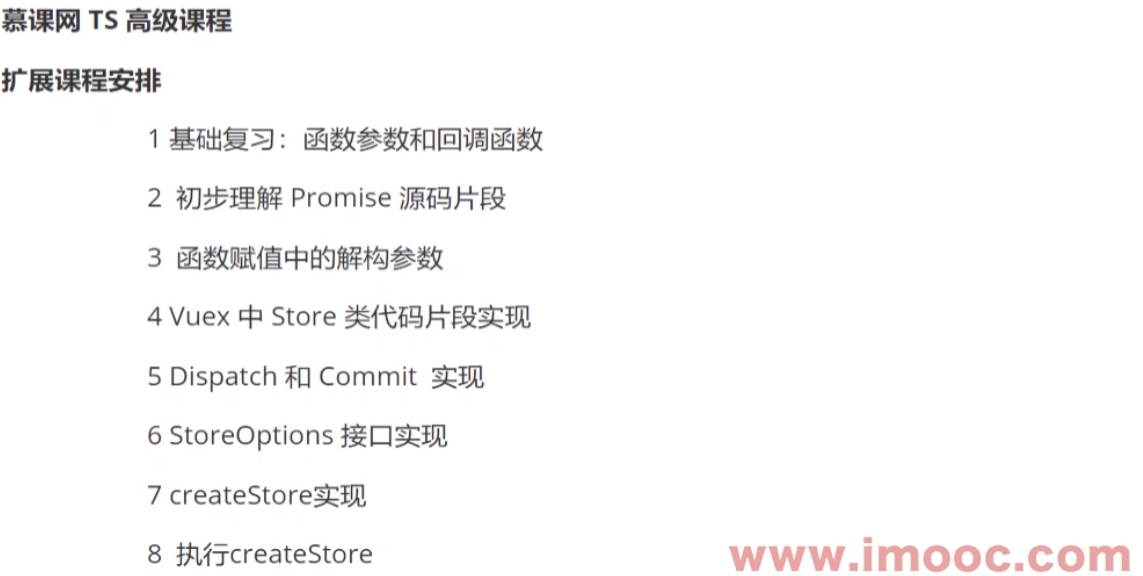课程名称: 晋级TypeScript高手,成为抢手的前端开发人才
课程章节: 9-28 【扩展: 为第11章手写 Promise 源码铺路】:从回调函数讲起【本节赠送,会的略过】
课程讲师: keviny79
课程内容:
本章节是复习 函数参数和回调函数,为第11章手写 Promise 源码铺路。
定义函数类型:
// (text:string) 函数变量
// => string 函数返回值类型
type FuncType = (xxx:string) => string
使用定义的函数类型:
type FuncType1 = (one: number, two: string) => string
// 1-1 定义函数变量
// 1-2 右边的函数需要符合 定义的函数‘类型( FuncType1 )’
let func: FuncType1 = function (one: number, two: string): string {
return "sss";
};
//-----------------------------
// 1-3 对上面的写法做一个改变
let func2: FuncType1 = function (one: number): string {
console.log(one)
return "sss";
};
// 理解:
// 上面少写一个函数参数,也是可行的。
// 为什么可以?这里可以理解为和继承一样,
// 多个参数不能继承少个参数,如下
type FunTestType1 = (one: number, two: string) => string
type FunTestType2 = (one: number) => string
// 这里返回 never
type beginType1 = FunTestType1 extends FunTestType2 ? FunTestType1 : never
// 少的参数可以继承多的参数,如下
// 这里返回 FunTestType2
type beginType2 = FunTestType2 extends FunTestType1 ? FunTestType2 : never
// 所以 1-3 那理解为,右边 函数 继承 FuncType1定义的函数类型。
// 因为定义的函数类型,变量比声明的函数变量多,所以 1-3 没有报错
//-----------------------------
// 使用 1-3 声明的函数
// 这里需要传递两个参数,
// 因为这里你给这个函数变量约束为 FuncType1 函数类型,
// 所以要符合这个声明的函数,而这个函数类型是有两个变量的,这里就需要传递两个参数
// 如果你不给这个 函数变量 添加约束也就是 let func2 = (xx:number):string => {return ''},这样就会根据 = 右侧的函数自动推到 func2 的函数类型
// 当然在 函数体中只能输出一个 函数参数,因为你函数体只写了一个函数参数
func2(123, 'abc')
回调函数:
type FuncType1 = (one: number, two: string) => string
// 定义一个函数,函数中 func 参数的类型是 FuncType1,FuncType1是一个函数
// 所以 func 需要传递,符合 FuncType1 类型的 函数
function testFun(func: FuncType1 ) {
// 调用外部传递的函数,
// 这里调用需要符合 FuncType1 函数类型 的规则
func(12, "abc") // 回调函数
}
// 这里调用定义的函数,
// 传递的函数也是符合 FuncType1 类型的。
// 传递一个参数为什么符合,你可以看 s100 代码
testFun(function (one: number):string {
console.log(one)
return "sss";
})
// s100 代码
function testFun(
func: FuncType1 = function (one: number):string {
console.log(one)
return "sss";
}
) {
func(12, "abc")
}
课程收获:
本节对函数类型声明和使用时参数的变化,有了清晰的理解
点击查看更多内容
为 TA 点赞
评论
共同学习,写下你的评论
评论加载中...
作者其他优质文章
正在加载中
感谢您的支持,我会继续努力的~
扫码打赏,你说多少就多少
赞赏金额会直接到老师账户
支付方式
打开微信扫一扫,即可进行扫码打赏哦






